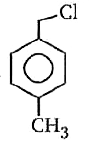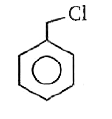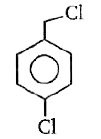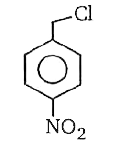Which of the following solvent is suitable for SN1 reaction ?
Non- polar
Polar protic
Polar aprotic
all of these
The correct Answer is:2
To determine which solvent is suitable for an SN1 reaction, we need to understand the characteristics of the SN1 mechanism and the role of solvents in this process.
1. Understand the SN1 Mechanism:
- The SN1 (Substitution Nucleophilic Unimolecular) reaction involves two main steps:
1. Formation of a carbocation intermediate.
2. Nucleophilic attack on the carbocation.
2. Identify the Role of Solvents:
- The choice of solvent can significantly influence the rate and outcome of the reaction. In the case of SN1 reactions, the solvent must be able to stabilize the carbocation that forms during the reaction.
3. Characteristics of Suitable Solvents:
- Polar Protic Solvents: These solvents have a polar nature and can form hydrogen bonds. They are capable of stabilizing charged species, such as carbocations, through solvation.
- Examples of polar protic solvents include water, alcohols (like ethanol), and acetic acid.
4. Why Polar Protic Solvents are Preferred:
- Stabilization of Carbocation: The polar protic solvent stabilizes the carbocation intermediate formed during the SN1 reaction. This stabilization is crucial because the stability of the carbocation directly affects the rate of the reaction.
- Interaction with Nucleophile: Polar protic solvents can also interact with the nucleophile, which can enhance its reactivity and facilitate the nucleophilic attack on the carbocation.
5. Conclusion:
- Therefore, the suitable solvent for an SN1 reaction is a polar protic solvent due to its ability to stabilize the carbocation and enhance nucleophilic attack.
Final Answer:
The suitable solvent for an SN1 reaction is a polar protic solvent.
- The SN1 (Substitution Nucleophilic Unimolecular) reaction involves two main steps:
1. Formation of a carbocation intermediate.
2. Nucleophilic attack on the carbocation.
- The choice of solvent can significantly influence the rate and outcome of the reaction. In the case of SN1 reactions, the solvent must be able to stabilize the carbocation that forms during the reaction.
- Polar Protic Solvents: These solvents have a polar nature and can form hydrogen bonds. They are capable of stabilizing charged species, such as carbocations, through solvation.
- Examples of polar protic solvents include water, alcohols (like ethanol), and acetic acid.
- Stabilization of Carbocation: The polar protic solvent stabilizes the carbocation intermediate formed during the SN1 reaction. This stabilization is crucial because the stability of the carbocation directly affects the rate of the reaction.
- Interaction with Nucleophile: Polar protic solvents can also interact with the nucleophile, which can enhance its reactivity and facilitate the nucleophilic attack on the carbocation.
- Therefore, the suitable solvent for an SN1 reaction is a polar protic solvent due to its ability to stabilize the carbocation and enhance nucleophilic attack.
The suitable solvent for an SN1 reaction is a polar protic solvent.
Topper's Solved these Questions
- HALOALKANES AND HALOARENES BOOK - AAKASH INSTITUTE ENGLISHCHAPTER - HALOALKANES AND HALOARENES EXERCISE - Assignment (Section - B ) ( Objective Type Question(One option is correct ))
36 Videos
- HALOALKANES AND HALOARENES BOOK - AAKASH INSTITUTE ENGLISHCHAPTER - HALOALKANES AND HALOARENES EXERCISE - Assignment (Section - C ) ( Objective Type Question(More than one options are correct ))
17 Videos
- HALOALKANES AND HALOARENES BOOK - AAKASH INSTITUTE ENGLISHCHAPTER - HALOALKANES AND HALOARENES EXERCISE - Illustration
6 Videos
- GENERAL PRINCIPLES AND PROCESSES OF ISOLATION OF ELEMENTSBOOK - AAKASH INSTITUTE ENGLISHCHAPTER - GENERAL PRINCIPLES AND PROCESSES OF ISOLATION OF ELEMENTSEXERCISE - Try Yourself
33 Videos
- HYDROCARBONSBOOK - AAKASH INSTITUTE ENGLISHCHAPTER - HYDROCARBONSEXERCISE - Assignment(Section - C) (Previous Years Questions)
60 Videos
Similar Questions
Knowledge Check
Rate of SN1 reaction is :
 AS>Q>R>PBS>R>P>QCP>Q>R>SDS>R>Q>P
AS>Q>R>PBS>R>P>QCP>Q>R>SDS>R>Q>P
Which of the following products can be obtained by SN1 reaction?A B
B C
C D
D
Which of the following is most reactive towardSN2 reaction ?
A B
B C
C D
D
Which of the following can’t be an example of an SN2 reaction?
View SolutionWhich one of the following reagents is not suitable for the elimination reaction?

View SolutionWhich of the following alkyl halides will undergo SN1 reaction most redily ?
View SolutionWhich of the following is most reactive towardSN2 reaction ?
View SolutionWhich of the following reactions take place by SN2 reaction?
View Solution
